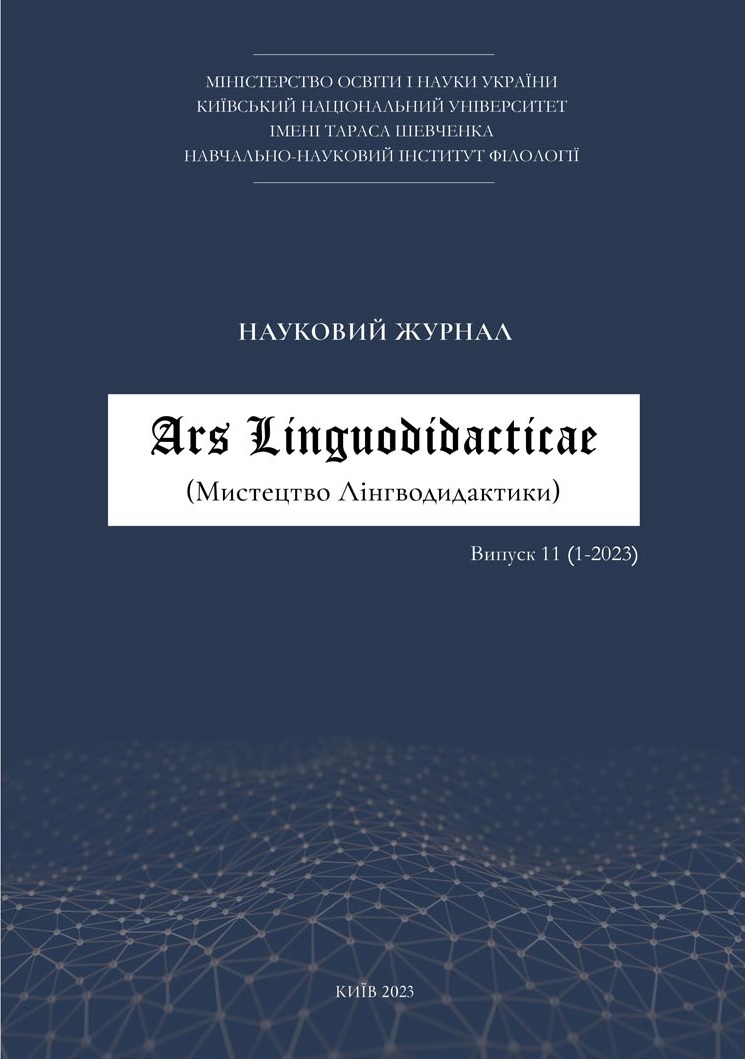DEVELOPING ENGLISH LEXICAL COMPETENCE IN PROFESSIONAL ENVIRONMENT: DETAILED LESSON PLAN ON THE TOPIC «IMMUNITY» FOR SECOND-YEAR MAJORS IN BIOLOGY
Keywords:
English lexical competence development, ESP, lesson plan, students majoring in BiologyAbstract
This publication is a detailed lesson plan on the topic «Immunity» designed for the second-year students majoring in Biology. The lesson is aimed at lexical elements acquisition alongside with lexical skills development in job-related areas. The material presented satisfies the requirements of the National ESP Curriculum focusing on integrated approach to the formation of linguistic and specialism-related competence. Application of both non-verbal and verbal visual aids contributes to successful learning by activating students’ thinking and emotional involvement. Academic discourse meant for Listening and Reading highly correlates with professionally oriented documentary discourse based on current scientific research. Audio and video discourse patterns provide the grounds for standard phonation of special terms, which is of primary importance to English where all the lexical items need to be transcribed due to striking discrepancy between their oral and written forms. New Vocabulary items are practised in a variety of speech activities occurring within a study-related situational context. Listening Comprehension is based on classifying lexical terms in accordance with their semantic fields, filling the gaps in the text, and finding the correct order of the events. Reading Comprehension aims at developing students’ skills of reasoning, evaluating and interpreting the contents.
References
BBC. (2011, July 26). Am I normal? (Series 8, Episode 2). (Audio). BBC podcast. https://www.bbc.co.uk/sounds/play/b012qtw0
Gazzola, A. (2015, April 20). Health proverbs to live by. BodyandSoul. https://bit.ly/3CMLfcM
Great Pacific Media. (2009, October 29). Introduction to how the immune system works [Video]. Youtube. https://youtu.be/IWMJIMzsEMg
Lutkovska, N.M., Kozachuk, S.M. (2021). Posibnyk z profesiyno oriyentovanoho kursu anhliysʹkoyi movy. [A guide to the professionally oriented English language course]. Talkom.
Mader, S. (2010). Human biology (11th ed.). McGraw-Hill.
Downloads
Published
How to Cite
Issue
Section
License
Copyright (c) 2023 Наталія Лутковська

This work is licensed under a Creative Commons Attribution-NonCommercial 4.0 International License.
This work is licensed under a Creative Commons Attribution-NonCommercial 4.0 International License.
Copyright policy according to the terms of the license: Creative Commons "Attribution-NonCommercial" 4.0 International (CC BY-NC 4.0).
Authors who publish their articles in "Ars Linguodidacticae" (Open Access Journal) retain the following rights:
- The authors retain the copyright of their article and grant the Ars Linguodidacticae journal the right to first publish the manuscript of their article under the Creative Commons (CC BY-NC 4.0) Attribution License, which allows others to freely distribute the published work with mandatory reference to the author of the original work and first original publication in the Ars Linguodidacticae journal. An indication of the retention of the copyright of the work is provided on the title page of the article.
- The authors reserve the right to enter into separate contracts for the non-exclusive distribution of their article as published in Ars Linguodidacticae (e.g., placing the article in electronic libraries, archives and catalogs or publishing it as part of institute collections and monographs), provided that a full reference to the first original publication in Ars Linguodidacticae is given.
- The policy of the "Ars Linguodidacticae" journal allows and encourages authors to post a manuscript both before and during editorial processing, as this promotes productive scientific discussion and has a positive effect on the speed and dynamics of citing the article.
The editorial board reserves publishing rights to:
- the collated original articles and to the entire issue of the journal.
- the design of the journal and original illustrative and supplementary materials.
- the reprint reprints of the Journal in printed and electronic form.
The copyright policy is carried out according to the terms of the license: Creative Commons "Attribution-NonCommercial" 4.0 International (CC BY-NC 4.0).
For more information, please read the full text of the CC BY-NC 4.0 Public License.
Creative Commons Attribution-NonCommercial 4.0 International License.

